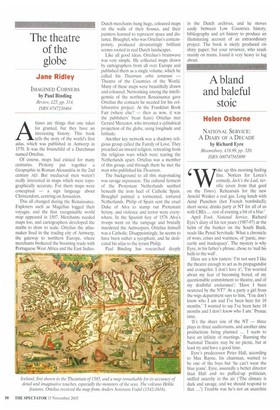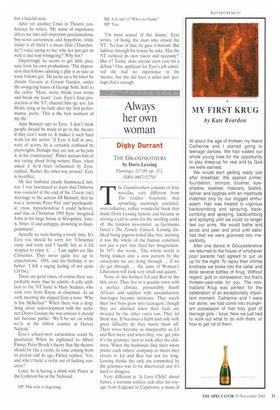A bland and baleful stoic
Helen Osborne
NATIONAL SERVICE: A DIARY OF A DECADE by Richard Eyre Bloomsbury, £18.99, pp. 320, ISBN 000747565899
W
‘ 07 up this morning feeling
fine. Notices for Lorca's
comedy, Tack's the Lad, ter
rific (even from that goof on the Times). Rehearsals for the new Arnold Wesker a real gas. Long lunch with Aim e Planchon (hot French bombshell); short siesta; drinks party at NT for all of us with CBEs ... rest of evening a bit of a blur,' April Fool. National Service, Richard Eyre's diary of his ten years (1987-97) at the helm of the bunker on the South Bank, reads like Penal Servitude. What a chronicle of woes, crises and wariness, of 'panic, insecurity and inadequacy'. The mystery is why Eyre, in his father's phrase, chose to 'nail his balls to the wall'.
Here are a few tasters: 'I'm not sure I like the theatre enough to act as its propagandist and evangelist. I don't love it'; 'I'm worried about my fear of becoming bored, of my questionable commitment to theatre, and of my doubtful endurance.; 'Have I been neutered by the NT?' At a party a girl from the wigs department says to him, 'You don't know who I am and I've been here for 18 months.' I wanted to say I've been here 18 months and I don't know who I am.' Prozac time.
'It's the sheer size of the NT — three plays in three auditoriums, and another nine productions being planned ... I seem to have an infinity of meetings.' Running the National Theatre may be no picnic, but at least try and have a good time. Eyre's predecessor Peter Hall, according to Max Rayne, his chairman, wanted to be one of the boys but 'he can't wear the blue jeans'. Eyre, assuredly a better director than Hall and no puffed-up politician, sniffed anarchy in the air ('The climate is dark and savage, and we should respond to that ...') Trouble was he's not an anarchist but a baleful stoic.
After yet another Crisis in Theatre conference he writes, 'My sense of impotence drives me into self-important proclamations, boy-scout earnestness and hyperbole, while inside it all there's a mean little (Thatcherite?) voice saying to me: why not just get on with it and stop whingeing?' Why not?
Dispiritingly he seems to get little pleasure from his own productions. 'The depression that follows opening a play is as sure as tonic follows gin.' He perks up a bit when he directs Traviata at Covent Garden, under the swingeing baton of George Solti. Solti to the cellos: 'More, more, break your wrists and break my heart.' Lear, Eyre's final production at the NT, cheered him up, too. Ian Holm, lying in his bath after the first performance, purrs, 'This is the best moment of my life.'
Alan Bennett says to Eyre, 'I don't think people should be made to go to the theatre if they don't want to. It makes it such hard work for the actors.' If Eyre is half in awe, wary of actors, he is certainly confused by playwrights. Perhaps they are not, as he puts it, in his 'constituency'. Pinter accuses him of not caring about living writers. Hare, when asked if he'd been influenced by Eyre, replied. 'Rather the other way around.' Eyre is mystified.
My late husband clearly flummoxed him, too. I was fascinated to learn that Osborne was wounded at the end of his 12-year (sic) marriage to the actress Jill Bennett; that he was a 'demonic Peter Pan' and 'psychopathic' (now, hypochondriac I could believe), and that at Christmas 1993 Eyre 'imagined John in his large house in Shropshire, lonely, bitter, ill and unhappy, drowning in disappointment'.
Actually we were having a lovely time. It's Eyre you should be sorry for: 'Christmas came and went and I hardly felt as if I'd stopped to enjoy it.' ... 'Last nights are like Christmas. They never quite live up to expectations.' 1991, and his birthday is no better: '1 felt a raging feeling of not quite LIVING.'
There are good times, of course there are, probably more than he admits. A jolly addition to the NT band is Mary Soames, who took over from Rayne as chairman. At an early meeting she slipped Eyre a note: 'Who is Ian McKellan?' When there was a dingdong about redevelopment with the architect Denys Lasdun she was anxious it should not become public: 'We'll be set on while we're at the ribbon counter at Harvey Nichols.'
Eyre's school-swot earnestness could be punctured. When he explained to Albert Finney Peter Brook's theory that the theatre should be like a violin, its tone coming from its period and its age, Finney replied, 'Yes, and who'd build a violin out of fucking concrete?'
Later, he is having a drink with Pinter at the Lyttleton bar at the National:
HP: This wine is disgusting. RE: It is, isn't it? Who's to blame? HP: You.
'I'm most scared of the shame,' Eyre writes, 'of being the man who closed the NT.' No fear of that; he gave it bottom. But halfway through his tenure he asks, 'Has the NT outlived its own vision and necessity?' Has it? Today, does anyone even care for a debate? One applicant for Eyre's job admitted she had no experience in the theatre, but she did have a safari suit. perhaps that's enough.



























































































 Previous page
Previous page